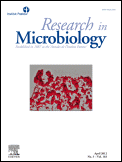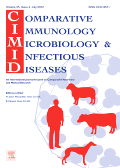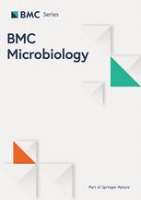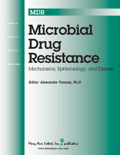
Reviews and Research in Medical Microbiology
Scope & Guideline
Advancing the Frontiers of Medical Microbiology
Introduction
Aims and Scopes
- Clinical Microbiology and Infectious Diseases:
The journal emphasizes research on the clinical aspects of infectious diseases, including case reports, epidemiological studies, and clinical characteristics of infections caused by various pathogens. - Antimicrobial Resistance:
A significant focus is placed on the study of antimicrobial resistance patterns, mechanisms, and the implications for treatment strategies across various bacterial, viral, and fungal infections. - Pathogen Genomics and Molecular Biology:
The journal features studies on the genetic and molecular characterization of pathogens, including virulence factors, resistance genes, and molecular epidemiology. - Therapeutic Approaches and Innovations:
Research on novel therapeutic strategies, including vaccine development, use of probiotics, and the role of non-coding RNAs in infections, is a prominent area of exploration. - Public Health and Epidemiology:
The journal also covers public health aspects related to infectious diseases, including surveillance studies, outbreak investigations, and the impact of infections on specific populations.
Trending and Emerging
- COVID-19 Research:
The journal has seen a significant increase in publications related to COVID-19, including studies on co-infections, immune responses, and the long-term effects of the virus. - Antimicrobial Resistance Mechanisms:
There is a growing trend in exploring the mechanisms of antimicrobial resistance, including the genetic basis of resistance and the development of novel treatments to combat resistant strains. - Impact of Microbiota on Health:
Research into the role of the microbiome in health and disease, particularly in relation to gut health and its implications for infections, is gaining traction. - Innovative Therapeutic Strategies:
Emerging themes include the exploration of adjuvants, therapeutic drug conjugates, and the use of probiotics in treating infections, reflecting a shift towards innovative treatment modalities. - Molecular Epidemiology and Genomics:
The trend towards understanding the molecular epidemiology of pathogens, including genomic surveillance and phylogenetic studies, is increasingly prominent in recent publications.
Declining or Waning
- Fungal Infections and Mycology:
While still relevant, the volume of research specifically focused on fungal infections and mycology has decreased compared to prior years, possibly due to a growing emphasis on bacterial and viral pathogens. - Zoonotic Infections:
Research on zoonotic diseases has become less prominent, indicating a potential waning interest or shift towards other pressing topics, such as antimicrobial resistance and pandemic threats. - Traditional Diagnostic Techniques:
The focus on conventional diagnostic methods has declined, as newer technologies and approaches are being adopted, reflecting a trend towards molecular diagnostics and rapid testing methods. - Antiviral Research:
The volume of research dedicated to antiviral therapies, particularly for non-COVID-19 viruses, appears to be less pronounced, possibly overshadowed by the focus on SARS-CoV-2.
Similar Journals

Microbiology Spectrum
Exploring the vast landscape of microbial science.Microbiology Spectrum is a prominent peer-reviewed journal published by the American Society for Microbiology, dedicated to advancing the field of microbiology through the dissemination of high-quality research. Since its inception in 2013 and continuing until 2024, the journal has established a strong presence in key domains such as microbiology, immunology, cell biology, and ecology, achieving impressive quartile rankings including Q1 in Infectious Diseases and Q1 in Immunology and Microbiology as of 2023. With an emphasis on open access to its scholarly content, Microbiology Spectrum aims to foster collaboration and knowledge sharing among researchers, professionals, and students alike. The journal's scope encompasses a diverse range of topics pertinent to the field, making it an essential resource for anyone involved in microbiological research and its applications. Researchers looking to publish their findings in a respected journal will find Microbiology Spectrum's robust impact factor and Scopus rankings serve as testament to its significance and influence within the academic community.

RESEARCH IN MICROBIOLOGY
Fostering innovation in microbiology for a global audience.Research in Microbiology, published by Elsevier, is a prominent academic journal devoted to advancing the field of microbiology, encompassing a diverse array of topics including immunology, molecular biology, and biochemistry. Established in 1987, the journal has expanded its focus over the years, with a commendable impact factor reflecting its relevance and influence in the scientific community. Although it does not currently offer open access options, Research in Microbiology remains a crucial resource for researchers and professionals seeking to stay abreast of the latest findings and methodologies. The journal holds a respectable Q2 ranking in Medicine (miscellaneous) and a Q3 ranking in both Microbiology and Molecular Biology for 2023, highlighting its position within the scholarly landscape. With its base in France and accessible to a global audience, Research in Microbiology continues to foster scholarly exchange, making it an essential platform for the dissemination of impactful microbiological research.

COMPARATIVE IMMUNOLOGY MICROBIOLOGY AND INFECTIOUS DISEASES
Advancing Knowledge in Immunology and MicrobiologyComparative Immunology Microbiology and Infectious Diseases, published by Elsevier Science Ltd, is a prominent journal dedicated to advancing the fields of immunology, microbiology, infectious diseases, and veterinary sciences. Established in 1978, this journal has become a vital resource for researchers and professionals alike, with a commendable impact factor that reflects its significance in academia. The journal, available in both print and electronic formats (ISSN: 0147-9571, E-ISSN: 1878-1667), stands out for its commitment to disseminating innovative research findings, particularly through its categorization in Q2 and Q3 quartiles across various related disciplines as of 2023. The journal aims to provide insightful comparative analyses that enhance our understanding of host-pathogen interactions, immune responses, and disease manifestations. With a global readership base, it serves as a platform for collaborative discourse among scientists and professionals, ultimately contributing to the improvement of health outcomes worldwide.

Emerging Microbes & Infections
Connecting researchers to combat emerging microbes.Emerging Microbes & Infections is a premier open access journal, published by Taylor & Francis Ltd since 2012, dedicated to advancing the understanding of microbial infections and their implications in human health. With an impressive Q1 ranking across multiple categories—including Drug Discovery, Epidemiology, Immunology, and Infectious Diseases—this journal is at the forefront of research in the microbiological sciences. Covering a diverse range of topics, it serves as a vital resource for researchers, healthcare professionals, and students alike. The journal's commitment to open access ensures worldwide dissemination of cutting-edge findings, fostering collaboration and innovation in tackling challenges posed by emerging infections. As part of the thriving academic community in the United Kingdom, Emerging Microbes & Infections plays a crucial role in shaping the future of infectious disease research and public health.

Current Clinical Microbiology Reports
Pioneering Discoveries in Clinical MicrobiologyCurrent Clinical Microbiology Reports, published by Springer, is a leading international journal dedicated to advancing the field of clinical microbiology. With a focus on the diagnosis, treatment, and prevention of infectious diseases, this journal serves as a vital resource for researchers, medical professionals, and students engaged in microbiological studies. As a testament to its quality and influence, it holds an impressive impact factor and ranks in the Q1 category in both Infectious Diseases and Microbiology (medical), reflecting its prominent standing in the scholarly community. Additionally, it features a commendable Scopus ranking, placing it in the 77th percentile for Medicine - Infectious Diseases and the 69th percentile for Medicine - Microbiology (medical). With contributions spanning over a decade, from 2014 to 2024, the journal continues to publish high-quality research articles that shape the future of clinical practices and public health policies. While access options are variable, the journal's commitment to open dialogue and dissemination of knowledge makes it a pivotal platform for those passionate about tackling microbial challenges in healthcare.

Microbiology Research
Connecting Researchers to the Microbial WorldMicrobiology Research, published by MDPI, stands as a pivotal open-access journal in the field of microbiology, having established its presence since 2010. Based in Switzerland, this journal strives to provide a platform for innovative research and cutting-edge findings in various branches of microbiology, including medical microbiology and molecular biology. With an impact factor that reflects its dedication to scholarly excellence, Microbiology Research is classified in the Q3 category for both microbiology and medical microbiology, and Q4 for molecular biology as of 2023, indicating its growing importance and outreach within these domains. The journal aims to foster discussion and collaboration among researchers, professionals, and students by presenting articles that cover a wide array of topics and methodologies in microbiological research. Leveraging its open-access model, Microbiology Research ensures that high-quality research is accessible to a global audience, thus facilitating the advancement of knowledge and innovation in the microbial sciences.

MEDICAL MICROBIOLOGY AND IMMUNOLOGY
Pioneering discoveries in the realms of microbiology and immunology.Medical Microbiology and Immunology is a renowned journal published by Springer, serving as a pivotal resource in the fields of microbiology and immunology. Established in 1971 and continuing its legacy through 2024, this journal features cutting-edge research and reviews that address critical advancements and challenges within these dynamic fields. With an impressive impact factor and a robust ranking, including Q1 categories in both Microbiology (medical) and Immunology, it stands at the forefront of scholarly communication, ranking 21st out of 140 in the realm of Medical Microbiology. Researchers and professionals are encouraged to explore a variety of studies that delve into the interactions between microorganisms and the immune system, making it an essential resource for anyone fascinated by these interconnected realms of health sciences. Although not open access, the journal is widely accessible through institutional libraries, ensuring that significant findings reach a global audience. The University of New York Plaza serves as its operational hub in the USA, reinforcing its international influence and dedication to advancing knowledge in microbiology and immunology.

New Microbes and New Infections
Bridging gaps in understanding novel infectious agents.New Microbes and New Infections is an esteemed peer-reviewed journal published by Elsevier Sci Ltd that has been a prominent platform for disseminating groundbreaking research in the fields of Infectious Diseases and Microbiology since its establishment in 2013. With an impressive Open Access model, this journal ensures that vital research findings are readily accessible to researchers, healthcare professionals, and academics worldwide. Positioned in the Q2 category for Infectious Diseases and Q3 for Microbiology in 2023, it reaches a significant global audience, as demonstrated by its high Scopus rankings—#44 out of 344 in Medicine: Infectious Diseases, and #34 out of 182 in Immunology and Microbiology. The journal aims to inspire new ideas and foster collaborations by publishing high-quality research focused on novel microbes and infections, thus playing a crucial role in advancing science and public health in an era where understanding infectious agents is more vital than ever.

BMC MICROBIOLOGY
Advancing microbiological research for a healthier world.BMC Microbiology is a leading open access journal published by BMC, dedicated to advancing the field of microbiology since its inception in 2001. With an ISSN of 1471-2180, this journal provides a vital platform for researchers, professionals, and students to share and access high-quality research and innovation in both general and medical microbiology. Based in the United Kingdom, BMC Microbiology holds a commendable Q2 ranking in both various microbiological categories according to the 2023 Scopus rankings, indicating its strong influence in the microbiological community, with a rank of #47 out of 140 in Medical Microbiology and #62 out of 182 in general Microbiology. The journal's commitment to open access ensures that groundbreaking research is freely available to facilitate collaboration and knowledge sharing among the global community of microbiologists. With a focus on publishing original research, reviews, and case studies, BMC Microbiology plays a critical role in disseminating information that can impact health and environmental conditions around the world.

Microbial Drug Resistance
Exploring Innovative Solutions to Microbial ChallengesMicrobial Drug Resistance, published by MARY ANN LIEBERT, INC, is a pivotal journal that explores the critical intersection of microbiology and pharmacology with a keen focus on antibiotic resistance and related issues. Since its inception in 1995, this journal has established itself as a vital resource for researchers, healthcare professionals, and students, offering a platform for innovative studies that inform the global response to antimicrobial resistance. With a commendable position in the Category Quartiles, ranked Q2 in Medicine (miscellaneous) and Q2 in Pharmacology for 2023, it caters to a multidisciplinary audience by addressing the implications of microbial resistance within various medical contexts. Although currently non-Open Access, the journal allows subscribers and institutions to access high-quality, peer-reviewed research, directly impacting policy and practice in healthcare settings. Committed to advancing our understanding and combating the challenges posed by resistant microbes, Microbial Drug Resistance remains an essential publication in the fields of microbiology, immunology, and pharmacology.